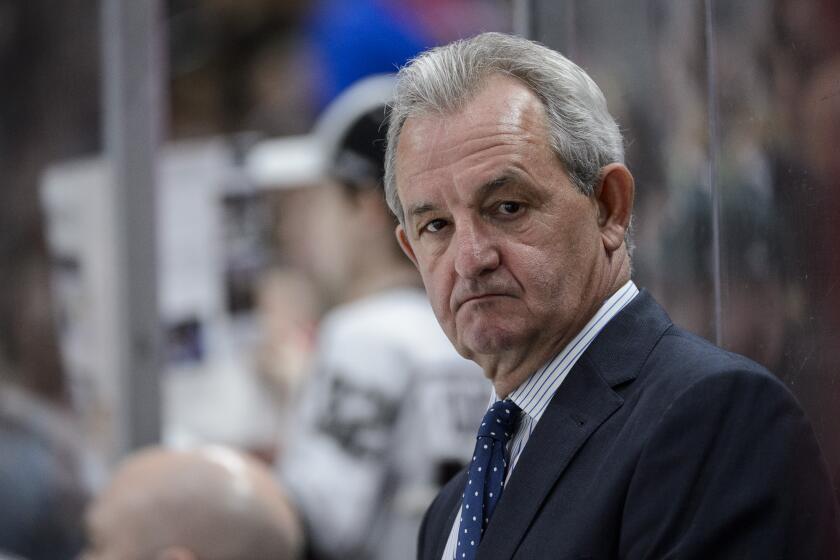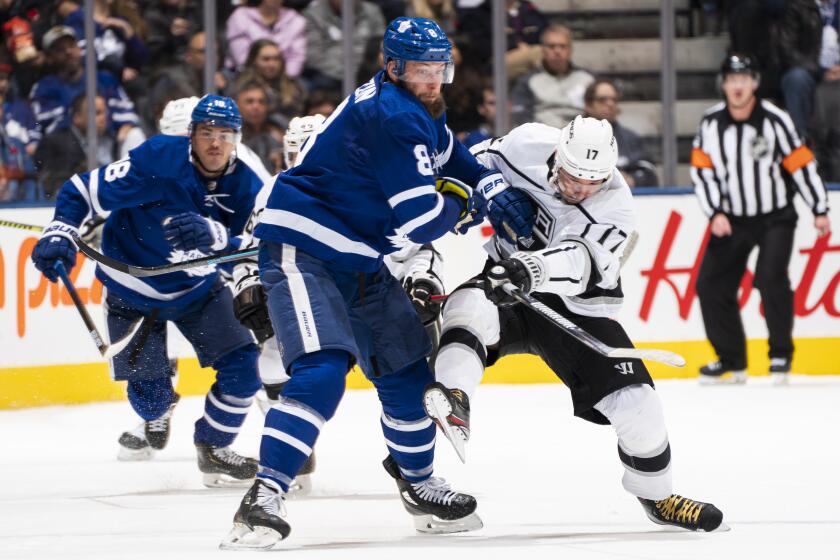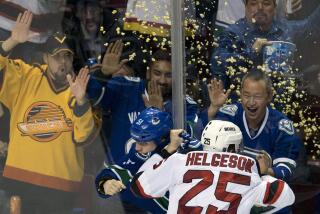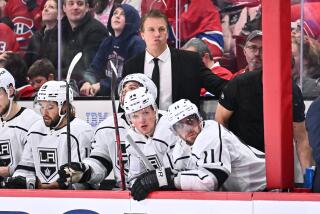Eliminating morning skates is NHL’s version of load management
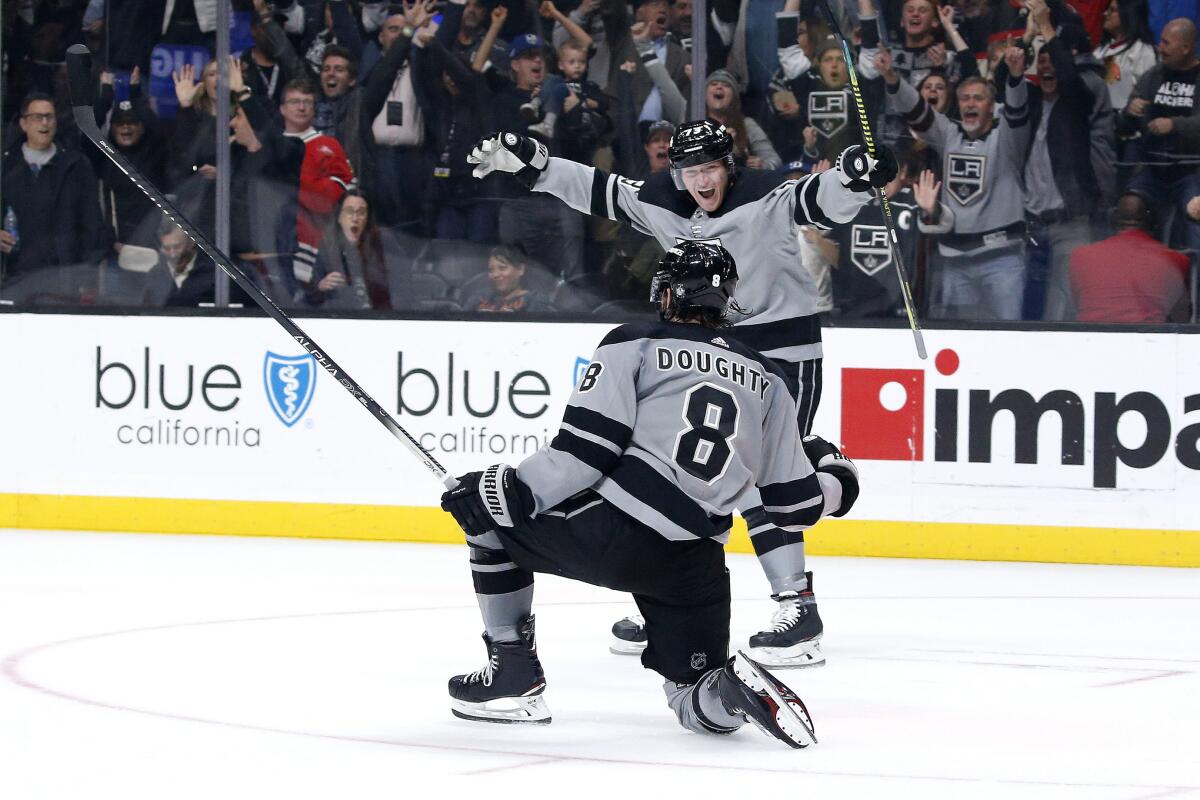
- Share via
Todd McLellan was raised in a different hockey generation.
When goalie pads looked half their current size, and scoring didn’t seem half as hard. When enforcers roamed the ice, and fighting was a form of currency. When the Kings were the NHL’s only Sun Belt team, and the league’s divisions were named after people instead of regions.
And, of course, the 52-year-old Kings coach, who enjoyed a three-year professional career before moving behind the bench in the mid-1990s, remembers when morning skates were a staple of the sport’s pregame ritual, a forum for players to get loose and sweat out sins from the late night before.
“Back in my day, when players were around, they lived a little differently,” McLellan said with a sly smile. “[Morning skates] were instilled for a different reason.”
Now, morning skates often aren’t instilled at all — a new trend for a new time.
Athletes across all sports are not only better-conditioned these days, but more cautiously cared for too. Football has adopted veterans days off. Basketball has agreed to load management. And hockey has embraced the elimination of mandatory morning skates.
Darryl Sutter enjoys his new role as an advisor for the Ducks and says he harbors nothing against the Kings, who fired him in 2017.
“I used to believe in them a lot,” McLellan said. “I’m certainly getting further away from them now.”
Not long ago, the Kings and Ducks were holdovers of the sport’s old habit. Under new coaches this season, however, they have charged toward the forefront of change.
“[Players] use up so much energy on a nightly basis — even the players that play six or seven minutes, they’re hard, heavy minutes — that rest is sometimes important,” McLellan said.
This season, McLellan has often opted for optional skates. He still has a team of veterans who have grown accustomed to the routine. But the more young prospects matriculate into the Kings locker room, the more he might have to tweak pregame plans.
Before facing the Vancouver Canucks last month, McLellan canceled the morning session for extra video work. He expects such days to become more common.
“We’re trying to please a lot of people from different eras,” McLellan said. “I’m not sure the young player that’s coming out of junior or college needs them or even wants them or understands why they exist yet there are some older players that it triggers their day, it gets them in a routine, it starts the rhythm of a game.
“You see basketball teams — fewer shootarounds in the morning, and soccer teams that aren’t using it as much. So, it’ll eventually go away, but we’re still caught in between different generations.”
In Anaheim, new Ducks coach Dallas Eakins has been far more aggressive in abolishing the tradition. During his first NHL job with the Edmonton Oilers in 2013-14, Eakins was one of the first coaches to phase out the familiar practice. This year — especially given his team’s hectic schedule over the first month of play — Eakins has only held a morning skate if the Ducks didn’t practice the day before.
“It’s wasted energy unless you’re going out there to accomplish something,” Eakins said. “Those days of players being out all night before a game are long gone.
The Kings allow two third-period goals in 30 seconds in a 3-1 loss to the Toronto Maple Leafs.
“If there was something really meaningful that I thought we just had to practice, then we’ll do it. But to just go out there and skate around on this whole premise of, ‘Hey we want to get a sweat,’ I’d rather them just sweat at night. I just think it’s wasted energy.”
It is the same broad reasoning behind the increasing number of NBA stars sitting out regular-season games, and why more NFL training camps are seeing veterans practice less.
As technology has advanced this decade, so too has the tendency for teams to work their athletes less. On the ice, both the Kings and Ducks use player-tracking software that measures everything from speed to workload. Fatigue management has literally become an exact science. Like myriad other old norms, morning skates are struggling to fit into that equation.
“I kind of like it,” Ducks forward Jakob Silfverberg said Tuesday morning, standing in a locker surrounded by stalls adorned with gear that wouldn’t be touched until that night.
The only empty space in the room belonged to defenseman Erik Gudbranson, who arrived in a trade last week and stepped on the ice for a quick solo skate.
“I don’t think he’s quite used to it yet,” Silfverberg said with a laugh. “For me, I think it’s great. You save your energy. You’re mentally more excited to step on the ice tonight.”
More to Read
Go beyond the scoreboard
Get the latest on L.A.'s teams in the daily Sports Report newsletter.
You may occasionally receive promotional content from the Los Angeles Times.

